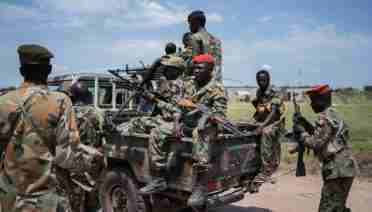What are the most corrupt countries in Africa? According to the Corruption Perceptions Index (CPI), Somalia is Africa’s most corrupt country currently. The CPI rates 180 countries in the world on a scale of 0 (highly corrupt) to 100 (highly clean).
Among the transparent nations in the world are Seychelles, Botswana, Cabo Verde, Rwanda, Namibia as well as Mauritius. Somalia, South Sudan, Sudan, Guinea Bissau, and Equatorial Guinea are not only the most corrupt nations in Africa but also in the world.
Read Also: 10 Most Corrupt Countries in the World 2023
These countries score below 30 points out a possible 100 in the latest CPI ranking. In the African region, six countries that recorded above 50 per cent are Seychelles, Botswana, Cabo Verde, Rwanda, Namibia and Mauritius and are among the least corrupt nations in the world.
Most Corrupt Countries in Africa
“Corruption remains the most daunting challenge to good governance, sustainable economic growth, peace, stability and development in Africa. While corruption is a global phenomenon, the impact is felt more in poor and underdeveloped countries, where resources for development are unduly diverted into private hands, which exacerbates poverty.
“In many corruption perception surveys, Africa is perceived as the most corrupt region in the world, as well as the most underdeveloped and backward region,” a UN report says.
These are the top 10 most corrupt countries in Africa:
| Rank | Country | Global Ranking | CPI Score (out of 100 points) |
| 1 | Angola | 165 | 19 |
| 2 | Chad | 165 | 19 |
| 3 | Congo | 165 | 19 |
| 4 | Burundi | 170 | 17 |
| 5 | Libya | 170 | 17 |
| 6 | Equatorial Guinea | 172 | 16 |
| 7 | Guinea Bissau | 172 | 16 |
| 8 | Sudan | 172 | 16 |
| 9 | South Sudan | 178 | 13 |
| 10 | Somalia | 180 | 10 |
The world’s deadliest epidemic right now, which has led to more loss of lives than the combined effect of all the world wars, is corruption. There has been a spike in world corruption, particularly in the last 30 years.
African countries continue to hold the unenviable status of the most corrupt nations on earth. Moreover, the saddest development is the fact that corruption, perceived as a vice propagated due to poverty has proven to have a deeper cause other than a mere lack of access to basic amenities.
Recent happenings have shown that corruption is more a result of greed and selfishness than it’s of poverty.
Related:
- 10 Best Cities to Live in Africa
- Top 10 Most Spoken Languages in Africa
- 10 Cleanest Cities in Africa
According to statistics, those who perpetrate corrupt practices are the high and mighty in society. They are the people you’ll vow wouldn’t have anything to do with such an ignoble attribute, due to their status, wealth as well as religious affiliation.
Every year, Transparency International publishes a report ranking 180 countries all over the world, based on the Corruption Perceptions Index. To determine the corruption levels in countries, the body makes use of a methodology, based on assessment & comparison with the aid of different benchmarks.
Some of these are monitoring public procurement processes, establishing concrete guidance for companies on how to avoid extortion and curtailing bribery and accessing reliable diagnostics for corruption measurement and mapping.
Corruption: The Bane of Development in Africa
Corruption in African countries sabotages economic, political as well and social development. It’s been a major barrier to good governance, economic growth, and basic freedoms like freedom of speech or the rights of citizens to hold governments accountable. Apart from these, corruption affects the well-being of individuals, families and communities.
According to the 2019 Global Corruption Barometer for Africa, which is an extensive public opinion survey conducted by Transparency International & Afrobarometer, Sudan was rated second as regards the percentage of individuals that perceived corruption to have increased in the last year.
The Democratic Republic of the Congo led the pack.
The report, which was drawn from the experiences of over 47,000 respondents across 35 African countries, estimates about 130 million people have given bribes in the past 12 months while seeking access to everyday services, such as education, health care, a chance at justice, or requesting a government-issued ID.
Though corruption remains a global issue, as can be seen in the CPI ranking of Russia, Mexico, or Indonesia (all with a CPI score of around 30 points), corruption levels and perceptions of government efforts to tackle the menace vary widely across the African region.
Ultimately, it is the citizens that bear the brunt of the callous practices of the various corrupt regimes in Africa and other affected regions around the world.
Discussing the menace of bribery and corruption in Africa, Sheila Masinde, who is Transparency International’s project manager for Kenya, said: “The people who are paying bribes are twice as likely to be the poorest, people who are less advantaged and under extreme pressure.”
You’ve learnt a lot from this article, do not forget to share with your friends and family on Facebook, Twitter and WhatsApp. You can also follow us on Facebook and Twitter.

Leave a Reply
You must be logged in to post a comment.